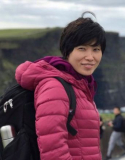
Hoa Nguyen
To be honest, development is not my background. I have gained my knowledge of development mainly through experience during a ten-year period of working with NGOs in Viet Nam. When I worked with senior officers or policy makers, I did not feel so confident because I still lacked in-depth knowledge of development. “It’s time to learn more” - I talked to myself. I needed to deepen my knowledge and develop my professional skills. I wanted to have a holistic understanding of development theory and practices.
I wanted to go abroad to take this course as I believed I could get more valuable experiences and enjoy a better learning environment in a developed country. Importantly, I wanted to learn about international experience in development work. I shared my thoughts with my friend and he encouraged me to apply for the course in Maynooth University. I started to search for information about the MA in International Development in Maynooth University and found that the modules being delivered in the course were completely interesting. They were totally related to my work as a development practitioner. I also know that the quality of this programme is much better in Maynooth University than any other Irish universities. Particularly, the course is taught by professional lecturers with tens of years working in the international development sector in Ireland.
Having worked as the Ethnic Minorities Working Group (EMWG) Coordinator at the VUFO-NGO Resource Centre in Vietnam, I have coordinated EMWG events directly. Many individuals from the ethnic minority communities are empowered through having participated in our activities. They become capable to speak out in policy platforms, seminars, and dialogues at different levels.
I take pride in having contributed to increased partnerships between the EMWG, development partners and governmental agencies. In addition, I have done my best to build up close cooperation between the group and other civil society organisations (CSOs) and networks to promote gender equality and non-discrimination of vulnerable groups in Vietnam. They include, but are not limited to, preparation of the
CSO complementary report on implementation of the Convention on the Elimination of All Forms of Discrimination against Women (CEDAW) in Vietnam in 2015 and the joint report to the Human Rights Council’s Third Universal Periodic Review (UPR) of Viet Nam in 2018.
Last but not least, I have made an effort to construct a database of organisations working in remote and mountainous areas of Vietnam, which was launched in 2014. It was the first database of its kind, which still serves as the main source of relevant information for the NGO community, development partners, governmental agencies, academia and individuals.
To be honest, all the delivered modules in this course are interconnected and equally valuable to me. As a development worker in the era of globalisation and integration, I myself believe that development is not development without people. Each module of the course seems to be a separate piece of a puzzle. In order to make a whole picture, each piece needs to be fitted or stays aside. While the modules of Development Theory and Practice and Political Economy of Development provide students with a comprehensive understanding of the history of development, practices of development over time, power dynamics in development contexts, and the focus and role of SDGs, the modules of Human Development, Adult Learning, Result-based Management, Gender and Development, Human Rights and Advocacy, Anthropology and Globalisation, and Sustainable Livelihoods and Climate Change Adaptation place a focus on people. From people to people, people are at the centre of development in all spheres and at all levels. Importantly, the module on Research Methods helps to instruct students how to conduct social research in practice, which is an essential skill of a development practitioner.
Value every single value - the programme and the lecturers fully respect the diversity of their students. Every student has an opportunity to freely express their thoughts, feelings and experiences. Words are counted and values are widely shared and fully recognised in this programme.
